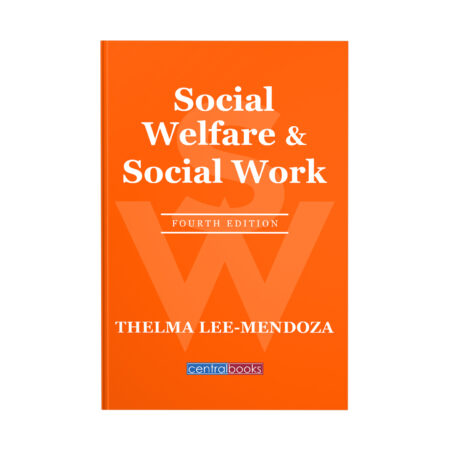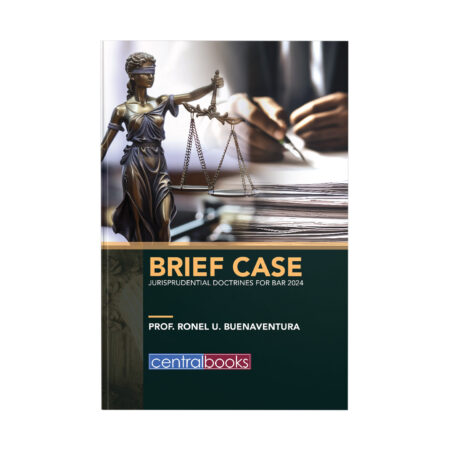
Legal Theory And Legal Reasoning (Great Impact On Your Case)
₱880.00Legal aspects and issues relevant to knowledge of law as well as legal practice are now complicated. Sometimes these new laws contradict and make complex simple cases.

Mining Act of the Philippines
₱1,180.00Mining Act of the Philippines
by: Dr. (Atty.) Jose C. Montemayor
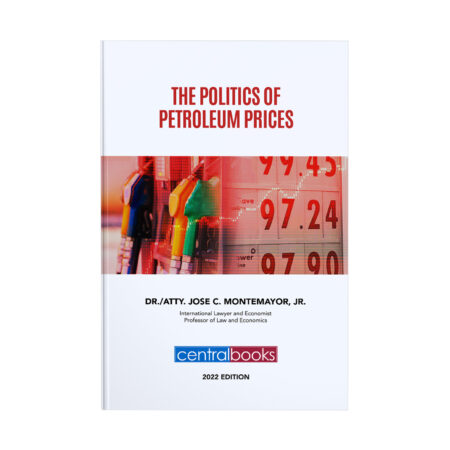
The Politics of Petroleum Prices
₱880.00Energy diplomacy is a form of diplomacy, and a subfield of international relations. It is closely related to its principal, foreign policy, and to overall national security, specifically energy security. Energy diplomacy began in the first half of the twentieth century and emerged as a term during the second oil crisis as a means of describing OPEC’s actions. It has since mainly focused on the securitization of energy supplies, primarily fossil fuels, but also nuclear energy and increasingly sustainable energy, on a country or bloc basis.

Intellectual Property
₱1,550.00IN THE STUDY OF INTELLECTUAL PROPERTY LAW IN THE PHILIPPINES, complicated legal procedures must be simplified but thorough, understandable though complex to solve legal problems especially when laws of different jurisdictions collide.
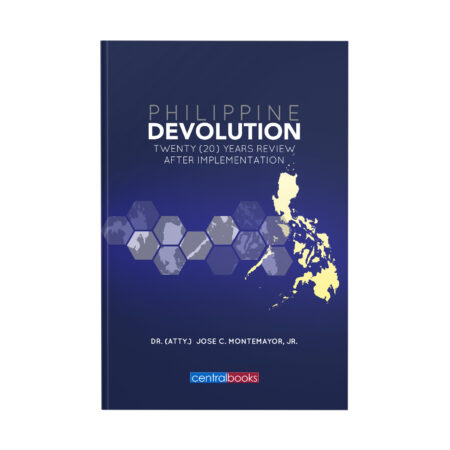

Heart Attack
₱580.00IN THE STUDY OF CARDIOVASCULAR DISEASES INCLUDING HEART ATTACK (MYOCARDIAL INFARCTION), complicated diagnostic and therapeutic approach makes it more difficult for doctors, patients and their families to alleviate these medical problems. These must be simplified and understandable so that prevention and treatment will be clear and thus, hasten the healing process of HEART ATTACK.

General Principles of Evidence
₱1,780.00Legal aspects and issues relevant to EVIDENTIARY LAW as well as IN legal practice are now complicated, complex and daunting.. Sometimes these new laws contradict and make complex simple cases in the application to evidence especially in the application of existing legal cases.
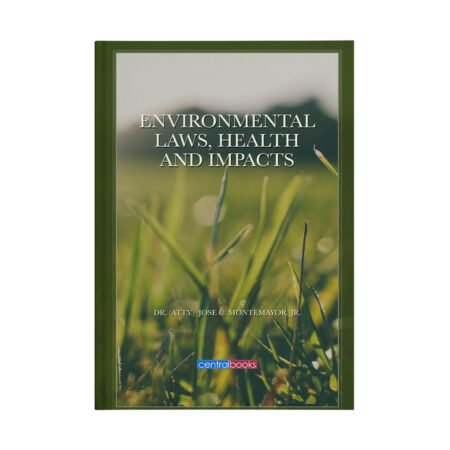
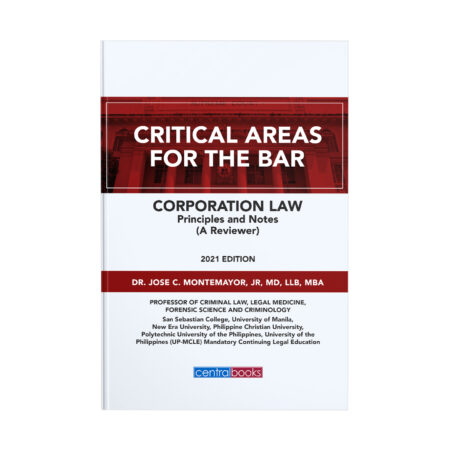
Critical Areas for the Bar: Corporation Law
₱880.00This new REVIEW BOOK ON CORPORATION LAW, is a new addition to the armamentarium of legal reviewers to equip EXAMINEES and be ready for every legal questions or challenge.
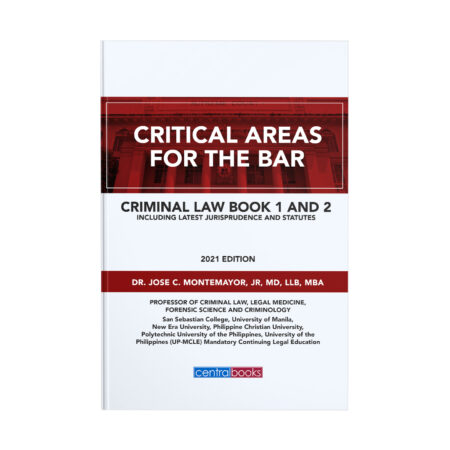
Critical Areas for the Bar: Criminal Law
₱750.00This new REVIEW BOOK ON CRIMINAL LAW, is a new addition to the armamentarium of legal reviewers to equip EXAMINEES and be ready for every legal questions or challenge.

Principles and Notes of Taxation Law (A Reviewer)
₱1,060.00Principles and Notes of Taxation Law (A Reviewer)
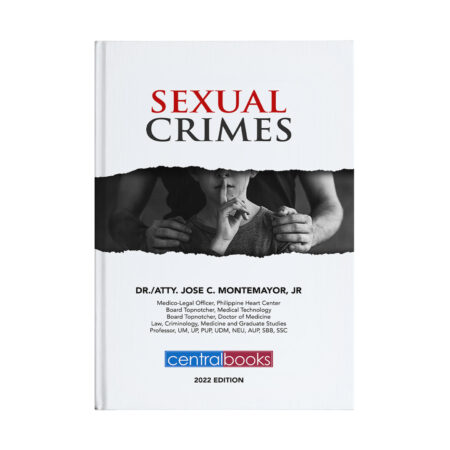
Sexual Crimes
₱1,880.00IN THE STUDY OF CRIMINAL LAW CONCERNING SEXUAL ABUSES IN THE PHILIPPINES, complicated legal procedures must be simplified but thorough, understandable though complex to solve sexual crimes especially committed against women.


Understanding Bail and Penalties
₱1,750.00“Understanding Bail and Penalties” is the fourth book co-authored by Prosecutors Ramon B. Mendoza and Eva Maria M. Biado in their earnest endeavor to share their professional insights and experiences as members of the Office of the City Prosecutor of Caloocan City.
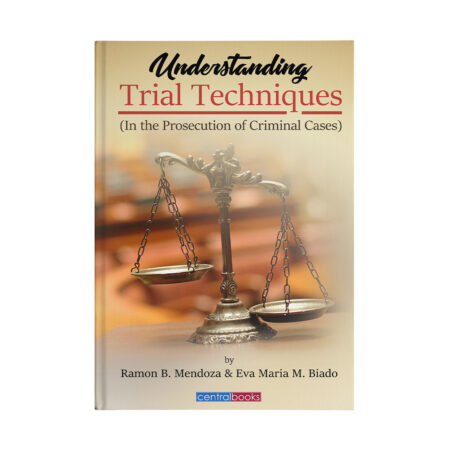
Understanding Trial Techniques
₱1,980.00Understanding Trial Techniques
by Ramon B. Mendoza and Eva Maria M. Biado

Understanding Trial Objections in Criminal Cases
₱1,200.00Understanding Trial Objections in Criminal Cases
by: Ramon B. Mendoza and Eva Maria M. Biado

The Ocean Space or the Maritime Area of the Philippines
₱720.00This paper is intended to be a “primer”, not a treatise, to inform on the fundamentals of the maritime area subject to the sovereignty and jurisdiction of the Philippines. For immediate and convenient reference, the pertinent provisions of the Law of the Sea Convention, the Philippine Constitution, and the relevant statutes, are quoted. Information largely drawn from the participation of the author in the meetings of both the Seabed Committee and the Third Conference on the Law of the Sea, appear in footnotes.
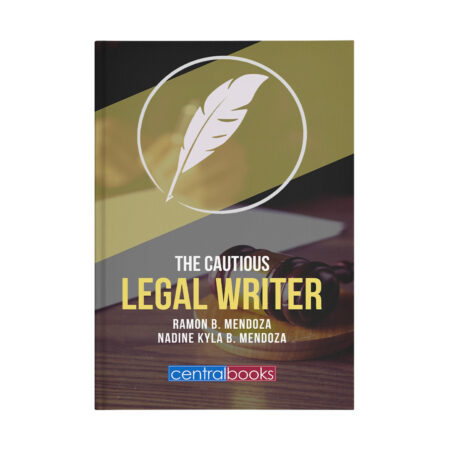
The Cautious Legal Writer
₱1,150.00Cautious Legal Writer is the first book co-authored by the father and daughter tandem, Prosecutor Ramon B. Mendoza and Nadine Kyla B. Mendoza. This book is a useful guide for lawyers, law students, and those who intend to enhance their English grammar skills. It provides the most common errors in English in alphabetical order with explanations and suggestions on how to correct them.

Revised Rules on Evidence (Commentaries, Rules, and Cases)
₱1,550.00Understanding the dynamic subject of evidence may be a daunting task to law students and law practitioners alike. Hence, I am delighted to read The Revised Rules on Evidence (Commentaries, Rules and Cases), which is the fourth book crafted by the father and daughter tandem. This book treats the entire subject of the evidence as revised, pursuant to A.M. No. 19-08-05-SC.

Quick and Easy Reviewer in Special Penal Laws (Volume III)
₱680.00Now that this reviewer has already served its initial pur-pose, the authors would like to share it to the bar examinees, law students, law practitioners, and all those who have interest in Special Penal Laws.
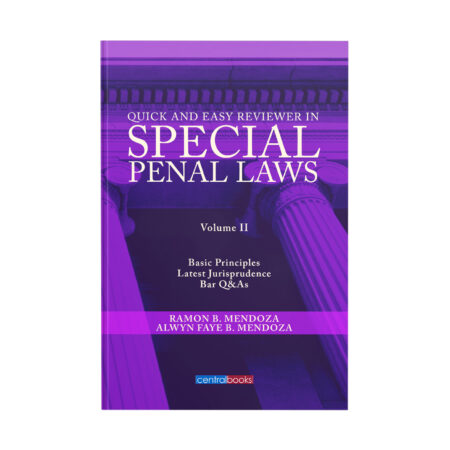
Quick and Easy Reviewer in Special Penal Laws (Volume II)
₱680.00This volume is a sequel to the first book of the same title by the authors. Just like the first volume, the paramount purpose in coming out with this volume is to help the bar candidates in their review of the different special penal laws.
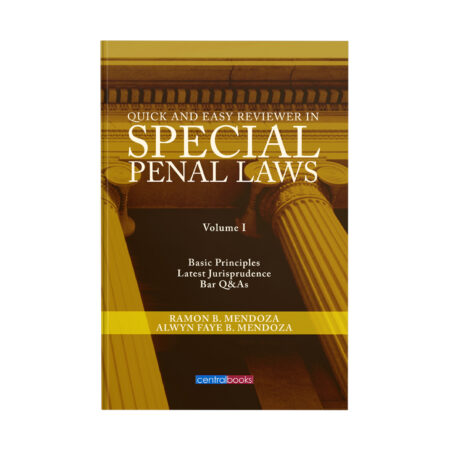
Quick and Easy Reviewer in Special Penal Laws (Volume I)
₱780.00This reviewer focuses only on the basic principles and MOST IMPORTANT topics, deliberately excluding those which the authors believe to be non-essential. The authors would like to share this book to the bar examinees, law students, law practitioners, and all those who have interest in Special Penal Laws. It it the authors fervent hope that this reviewer will help all law students and bar examinees accomplish their dreams of becoming members of the bar.

Special Penal Laws & Practical Exercises
₱1,380.00Special Penal Laws & Practical Exercises is the fifth book of the authors.This book deals with the special penal laws provided in the Supreme Court Syllabus for the 2022 Bar Examinations in Criminal Law.

Philippine Casualty Insurance Law
₱1,120.00The primary purpose of this work is to try to explain and even expand the Casualty Insurance Law in the Code which by the way is only allotted but one Section (Section 176) out of the 448 Sections of the Insurance Code.
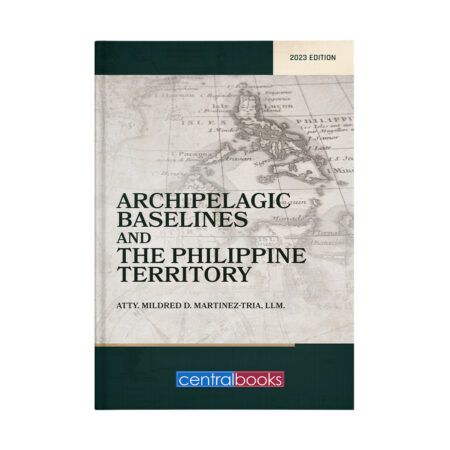
Archipelagic Baselines and the Philippine Territory
₱880.00This book focuses on the changes in the national territory of the country due to the application of the “straight archipelagic baselines” system under UNCLOS. It will likewise evaluate the effects of R.A. 9522 to our territorial integrity and sovereignty, national security and our economic development as a nation. It will analyze if our interest as an archipelagic nation is amply protected by this new baselines law and if we fulfilled our obligation incumbent upon us as a member of the family of nations under the Convention (UNCLOS).

Partnership and Corporation Accounting
₱1,080.00Each chapter is introduced by an actual business world story with pertinent learning outcomes. In addition, each chapter is
concluded by the chapter summary and appropriate discussion questions, exercises, and problems. Lastly, detachable quiz format questions are included that can be administered as a quiz.
Fundamentals of Accountancy, Business, and Management 2
₱480.00This humble work is intended as a textbook for senior high school students under the ABM track and for nonaccountants who wish to learn the basic fundamentals of accounting.

Fundamentals of Accountancy, Business, and Management 1
₱780.00This humble work is intended as a textbook for senior high school students under the ABM track and for nonaccountants who wish to learn the basic fundamentals of accounting.

School Administration and Supervision
₱780.00The book has been written in the simplest way the author feels would help the students’ understanding of the subject matter. She also tried to present the subject matters in an order she feels would follow an order of priority in terms of student learning.
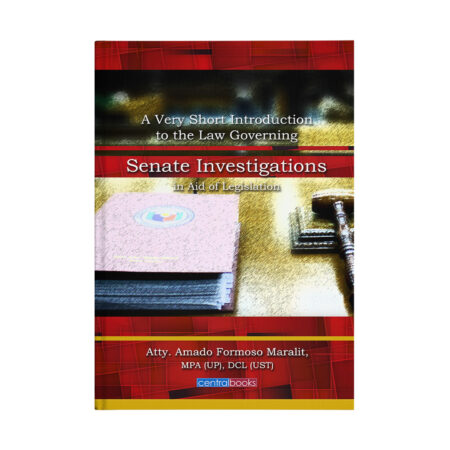
A Very Short Introduction to the Law Governing Senate Investigations in Aid of Legislation
₱1,280.00A Very Short Introduction to the Law Governing Senate Investigations in Aid of Legislation
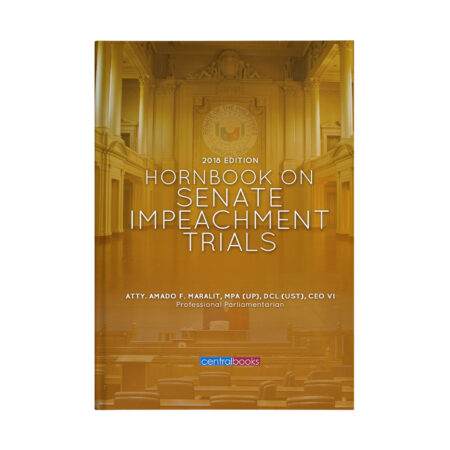

Empowering the Pinoy Persons With Disabilities
₱880.00This second edition released five years later, retains the basic and salient provisions of the first edition as it provides the intricate details of benefits to PWDs from the viewpoint of different stakeholders.
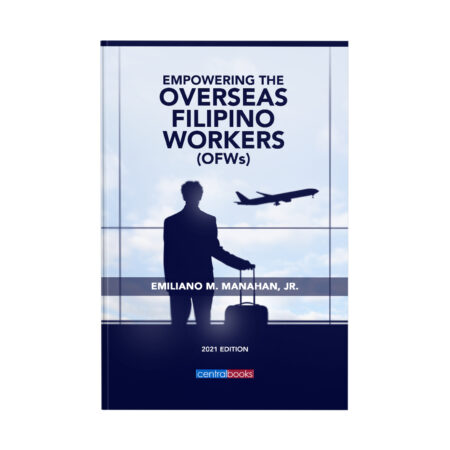
Empowering the Overseas Filipino Workers (OFWs)
₱940.00This is a non-fiction book, names, characters, businesses, places, events, locales and incidents are culled from true-to-life experiences but in observance of the rights to privacy of the persons involved, their identities are not revealed except for respondents who gave their permissions and those whose names are already publicly published.

Empowering the Consumers
₱880.00• Self-protection and redress mechanisms that are available to fraud victims in the marketplace
• Know your consumer rights under Philippine laws
Empowering the Elderly
₱850.00– Understanding the plight of the Pinoy elderly
– Helping them attain fulfilling old age experiences
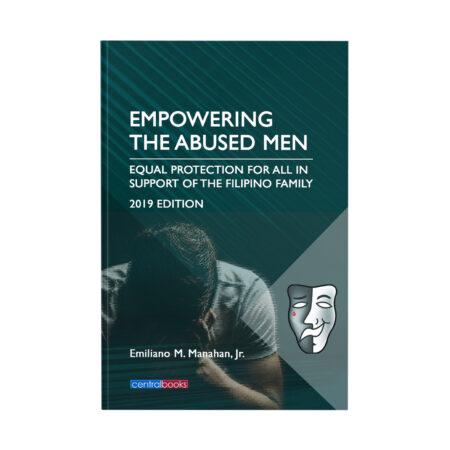
Empowering the Abused Men
₱880.00In this book, the author who advocates for the protection of rights of certain segments of society, especially the underprivileged, aims to awaken those concerned to act accordingly. He wants the abused and battered to have the courage to come out and assert their rights and seek protection without diminution of their dignity and self-esteem. He invites attention to legislation, albeit, in jesting fashion. After all, even animals are accorded protection.
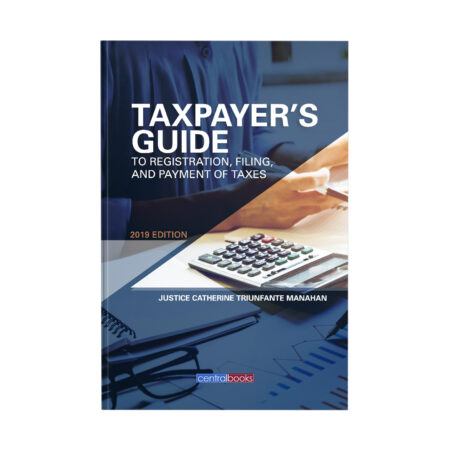
Taxpayer’s Guide (To Registration, Filing and Payment of Taxes)
₱950.00This current book, TAXPAYER’S GUIDE, still revolves around the common processes underlying tax compliance. These processes, generally covering registration, filing and payment of tax, address the tax obligations of the Filipino taxpayers. However, due to the breadth of the subject matter, the author has limited her discussion to income tax, business tax and withholding tax which are the taxes generally encountered by the taxpaying public.

A Concise Guide to Socioeconomic Benefits
₱820.00This book contains basic provisions of selected major Philippine social and economic legislations and government administrative orders.
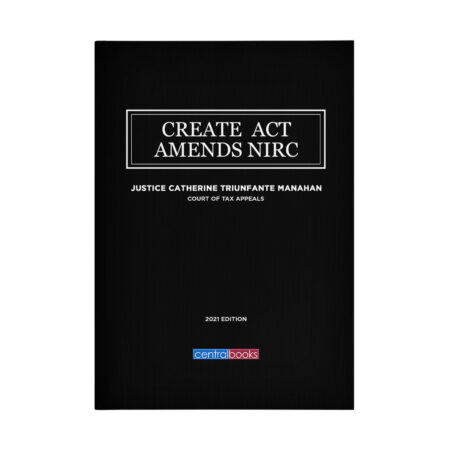
Create Act Amends NIRC
₱1,580.00Like the 2018 TRAIN edition, this latest edition of the NIRC as amended by the CREATE Act, will be very useful to taxpayers, tax professionals, students and those in the academe and even those in Government. The comparison of the provisions of the NIRC before and after the CREATE Act and related laws known as the Bayanihan One and Bayanihan Two featured as Appendices will surely come in handy for any reader of this book.

